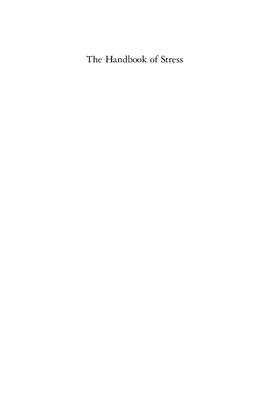Wiley-Blackwell Publishing, 2011, 693 pages
The Handbook of Stress represents an up-to-date and authoritative guide to both the beneficial and deleterious effects of stress on brain health. Contributions from inteational scholars in the field emphasize actions in the brain, from the molecular and cellular stage, to systems interactions and function.
Sections begin with studies addressing the basics of the stress response, and proceed to examine stress influences on brain plasticity across the lifespan, including links to anxiety, PTSD, and clinical depression. Each chapter concludes with an in-depth exploration of the ways in which variables such as gender, predisposition, and coping may influence stress outcomes.
With its breadth of coverage and cutting-edge scholarship on our current understanding of brain health, The Handbook of Stress is an essential resource for advanced students, professionals, and scholars at the highest level.
In this timely book leading investigators have contributed comprehensive and up-to-date articles assessing current understanding of critical stress influences on brain and behavior.
Chapters are written by leaders in their fields and the five parts of the book are well organized…it will serve admirably as an important resource for students of neuroscience, psychology, and physiology. It will be an invaluable reference book for all libraries, as well as for those whose major interest is in this field.
The Handbook of Stress represents an up-to-date and authoritative guide to both the beneficial and deleterious effects of stress on brain health. Contributions from inteational scholars in the field emphasize actions in the brain, from the molecular and cellular stage, to systems interactions and function.
Sections begin with studies addressing the basics of the stress response, and proceed to examine stress influences on brain plasticity across the lifespan, including links to anxiety, PTSD, and clinical depression. Each chapter concludes with an in-depth exploration of the ways in which variables such as gender, predisposition, and coping may influence stress outcomes.
With its breadth of coverage and cutting-edge scholarship on our current understanding of brain health, The Handbook of Stress is an essential resource for advanced students, professionals, and scholars at the highest level.
In this timely book leading investigators have contributed comprehensive and up-to-date articles assessing current understanding of critical stress influences on brain and behavior.
Chapters are written by leaders in their fields and the five parts of the book are well organized…it will serve admirably as an important resource for students of neuroscience, psychology, and physiology. It will be an invaluable reference book for all libraries, as well as for those whose major interest is in this field.

